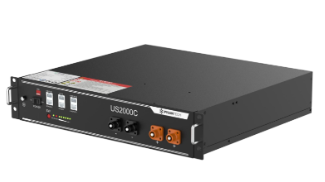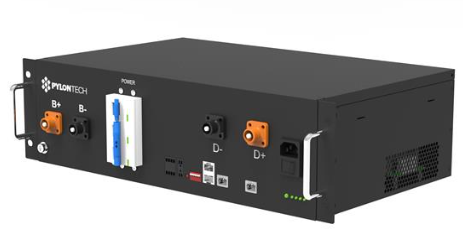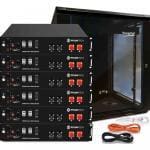Background on Pylontech – Company History
Pylon Technologies, Co. Ltd is a Chinese battery manufacturer that was founded in October 2009 and since then they have become one of the world’s leading providers of Energy Storage Systems (ESS). A subsidiary of Chinese telecommunications company ZTE, they produce a wide array of battery products across the full voltage range, from powerbanks, lithium-ion batteries to 100MWh systems for industrial use.
In 2013 they entered into the Battery Energy Storage Systems (BESS) market strategically to meet the growing demand for lithium-ion battery storage. Following this, they started mass production for the European and Australian market in 2014. In 2018, they made a mark in the industrial battery market by shipping 1GWh batteries globally. They furthered this development with a 1.5GWh large battery.
In December 2020, they solidified their growth by listing on the Shanghai Stock Exchange (STAR) Market with a successful Initial Public Offering (IPO) of more than $300 million USD, led by current CEO Wen Tan who is pushing for an aggressive move to expand their cell production and capacity expansion. For the financial year ending 2022, their revenues were over $83 million USD
In June 2021, they became the first BESS company in China to pass the certificate of SII Earthquake Countermeasures from TUV Rheinland Japan. This was a measure the Japanese government introduced that signals that a battery storage system could withstand an earthquake. They were also awarded the Top Storage Brand in Italy and Spain in 2021 from EUPD Research, which surveyed installers with their awareness regarding product quality and service. EUPD Research is a consulting firm in the technology and health sector
They currently have 2,040 employees with their products available in 80 countries.
Pylontech Lithium Batteries Models and Options
Pylontech has 2 series of batteries that have been approved by the Clean Energy Council for sale in Australia – the US series and the Powercube series
US Series

Pylontech’s flagship battery product is the US2000C, a module featuring a nominal capacity of 2.4 kWh and a usable capacity of 2.16 kWh. There are also higher-capacity options including the US3000C (3.5 kWh) and US5000 (4.8 kWh).
All batteries in the US series operate at a 48V nominal voltage and offer a 95% Depth of Discharge (DoD). The modular design allows for stacking, with up to 8 parallel modules in a rack. Pylontech’s LV Hub can be used to connect 5 strings of batteries, totalling 40 battery modules. This means the US series can handle all residential applications and can extend into small commercial battery solutions.
For most residential consumers, between 4-6 modules run in parallel should be sufficient for their needs as their energy consumption requirements would lie within the range of between 10 – 15kWh.
At 22.5kg per module they’re designed to be compact and easy to install. The batteries are designed to only be used inside with an environmental protection rating of IP20.
They have a working temperature of -20 to 60 degrees celsius which make them suitable to withstand the hot environmental extremes of Australia safely. On that point, they’re developed with lithium iron phosphate which is well known for their chemical safety with batteries, as well as providing a long cycle life.
The US series is designed to be compatible with a range of hybrid inverters including from major Australian brands including Goodwe, Sungrow, Solis and SMA. You can find the full compatible inverter list from here: Compatible Inverter list
Powercube Series

The PowerCube series utilises lithium iron phosphate (LFP) chemistry and is designed for small commercial applications. They come in 3 different models
- Powercube H1 – 2.4kWh capacity 48V
- Powercube H2 – 3.55kWh capacity 48V27
- Powercube M1C – 4.74kWh capacity 32V
Up to 27 battery modules can be stacked together under one controller meaning the total capacity of the solution can reach a nominal capacity of 128kWh with Powercube M1C series.
The battery modules should only be installed indoors with an IP rating of 20. All of the battery modules feature a depth of discharge of 95%.
Pylontech Battery – Key Features
There are a number of features of the Pylontech battery worth mentioning:
Compact Design
The Pylontech US2000B battery is designed to be compact and portable. The US2000B dimensions are 440*410*89 mm (W x H x D). As mentioned this makes them suitable for stacking in a rack indoors. So, if you have limited space in your household, this is a big plus. At 24kg, these batteries are lighter than the average solar battery in the market, which makes them easy to install and move if required.
Scalable Capacity
As we’ve mentioned, these batteries are modular in design which enables you to “rack and stack” them in order to scale the nominal capacity of your storage system. The advantage with this, is that it gives you the flexibility to expand your solar energy storage in the future. This may be useful if you’re finding that you’re finding your battery stretched with your night time use of appliances.
95% Depth of Discharge
The Depth of Discharge (DoD) of the US and Powercube series is 95%. This puts it ahead of some of Pylontech’s competitors, namely Sonnen (90% DoD and Alpha ESS (90% DoD).
DoD is an important factor to account for when making a buying decision for a solar battery. It’s the percentage of the battery that has been discharged compared with it’s stated capacity. The higher the DoD, the more available stored energy you can use, and hence greater potential you’re gaining from it.
How Much do Pylontech Batteries Cost?
The table below which provides an indicative guide based on data from Solar Choice’s Battery Price Index on the cost of installing a Pylontech USB2000 with different battery capacity:
| Pylontech US2000B Solar Battery | Wholesale Price Range ($AUD) |
| 2.4kW (1 module) | $1000 – $1100 |
| 19.2kW (8 modules) | $8000 – $8800 |
| Pylontech US3000C Solar Battery | Wholesale Price Range ($AUD) |
| 3.55kW (1 module) | $1500 – $1600 |
| 28.4kW (8 modules) | $12,000 – $12,800 |
Please note
- Prices are recommended wholesalers listed price and including back up box – final price a customer would be quoted depend on the installer’s mark up and installation costs
- Price estimates does not include any state-based incentives
To give this cost context it is important to balance the cost of a battery against the return of a cheaper power bill. Solar Choice’s solar and battery calculator is a comprehensive tool to understand the financial viability – although be warned, we looked at 48 scenarios and couldn’t find anything that made financial sense.
Since 2008 our knowledge and sophisticated software has allowed over 300,000 Australian households and businesses to make a well-informed choice on their solar & battery installer.
Australian Warranty Terms for Pylontech Batteries
As per Pylontech’s warranty documentation, the length of warranty for the US series and the Powercube series is 10 years which commences from the earlier of:
- The date of installation of the product or
- Six months after the date the product was manufactured.
It’s important to mention that notable exclusions to the warranty include the fact that an inverter or charger failure will invalidate a claim. It is not clearly defined what constitutes a “failure” and to what extent this has an adverse impact on the battery.
Customers should be aware that any repair or replacement by Pylontech for a defective battery will continue the original remaining warranty period. It does not constitute the warranty being reset to the original period.
The warranty documentation says that claims can either be made through an authorised reseller in Australia that the product was purchased from or from Pylontech directly. The only contact information for Pylontech directly is their chinese telephone numbers or email address, so you’ll likely be stuck contacting the ‘authorised resller’
The ‘local responsible supplier’ is listed as Master Instruments Pty Ltd who can be contacted on +61 2 9519 1200 or returns@master-instruments.com.au
Review Pylontech’s warranty document here.
Pros and Cons of Pylontech Battery
Pros:
- Compatible with a broad range of solar inverters
- Long history and track record in battery production
- 95% depth of discharge
Cons:
- Do not have Australian office to provide technical support or process warranty claims
US2000B & US3000C Specifications
| US2000B | 8 x US2000B (in parallel) | US3000C | |
| Usable Capacity | 2.16kWh | 17.28kWh | 3.2kWh |
| Nominal Voltage | 48V | 48V | |
| Discharge Voltage | 45 – 53.5V | 45-53.5V | |
| Charge/Discharge Current | 25A (recommended) | 37A (recommended) | |
| Cycle Life | >6000, 25 degrees celsius | >6000, 25 degrees celsius | |
| System Connection | Max 8 pcs in parallel | Max 8 pcs in parallel | |
| Battery Cell Technology | Lithium Iron Phosphate (LiFePO4) | Lithium Iron Phosphate (LiFePO4) | |
| Dimensions (W x H x D) | 449*410*89 | 449*3280*89 | 442*420*132 |
| Weight | 24kg | 192kg | 32kg |
| Operating Temperature Range | -20 to 60 degrees celsius | -20 to 60 degrees celsius | |
| Outdoor/Indoor | Indoor only (IP20) | Indoor only (IP20) | |
| Warranty | 10 years | 10 years | |
Independent Battery Testing
ITP Renewables have established an independent battery testing centre at the Canberra Institute of Technology and perform accelerated life cycle testing on batteries in 3 year phases. The centre is supported by a $1.29m grant from the Australian Renewable Energy Agency (ARENA) under its Advancing Renewables Program, and testing is conducted scientifically without interference from any manufacturers. ITP is currently testing 15 residential scale batteries available on the Australian market, and has had a total of 26 batteries installed at the centre.
The Pylontech US2000B commenced testing in 2017 as part of phase 2 of the program and the results are publicly available on the battery testing centre’s website.
We’ve sifted through the reports and can see that the battery experienced no operational issues relating to control, communication and reliability in its 4 years on the trial. Overall the capacity degradation rate observed in the testing centre looks to be in line with expectations.
Read About Home Battery Government Schemes Across Australia
South Australia, New South Wales, Victoria, and Australian Capital Territory all currently have a home battery scheme in place.
The South Australian Home Battery Scheme enables eligible South Australian residents to receive up to $4,000 per installed battery.
The New South Wales Home Battery Scheme offers an interest-free loan up to $9000 for eligible households looking to install a solar battery.
The Victorian Government under the Solar Homes Program provides to those eligible, a maximum discount of $4,174 off the battery sale price. The next release of battery rebates is on the 2nd of September 2020.
The Australian Capital Territory Government under the Next Generation Energy Storage program provides a rebate of $825 per kilowatt (kW). An average household with a 5kW system would be eligible for approximately $4,000.
Read more product reviews from Solar Choice
Since 2008 our knowledge and sophisticated software has allowed over 300,000 Australian households and businesses to make a well-informed choice on their solar & battery installer.
- 10 Cheapest Electricity Providers in Brisbane - 24 June, 2024
- Best Solar Inverters in Australia 2024 - 20 June, 2024
- Solar Edge Inverters – Independent Review - 20 June, 2024
